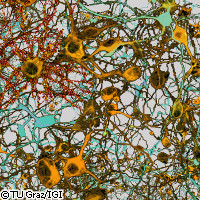Computer scientists take inspiration from nature in new EU project
EU-funded researchers are studying how our brains learn to design new computers. The BRAIN-I-NETS ('Novel brain-inspired learning paradigms for large-scale neuronal networks') project has been allocated EUR 2 million under the Information and communication technologies (ICT) Theme of the Seventh Framework Programme (FP7). The project partners aim to draw inspiration from natural learning processes in the brain to design the next generation of machines that can think for themselves and actively learn. 'In contrast to today's computers, the brain doesn't carry out a set programme but rather is always adapting functions and reprogramming them anew,' explained Dr Wolfgang Maass and project coordinator Dr Robert Legenstein of the Institute for Theoretical Science (IGI) at Graz University of Technology in Austria. 'Many of these effects have not been explained.' The human brain is made up of billions of nerve cells that are linked together by connections called synapses. These synapses change all the time - a phenomenon known as synaptic plasticity. This plasticity is behind the ability of brains to think and learn, and many computer scientists have sought to design computing systems based on natural neural networks. However, previous attempts to mimic brains' natural learning ability in this way were not entirely successful because researchers lacked important information about how our brains learn. 'Learning mechanisms implemented in the brain appear to be much more robust and flexible than those currently used in neurally inspired computing systems,' the project partners note. Recently, new techniques in neuroscience have allowed researchers to start tracking what happens in a learning brain in vivo. Early results from these experiments indicate that the rules governing synaptic plasticity may have to be rewritten. The BRAIN-I-NETS project partners will investigate the processes taking place in brains as they learn, analyse the rules governing these processes and apply them to computing systems. Their ultimate goal is to 'develop new design principles for adaptive, reconfigurable, very-large-scale hardware systems implementing novel learning rules inspired by biological neural networks in vivo'. Many of the tools used in BRAIN-I-NETS were developed in the FACETS ('Fast analog computing with emergent transient states') project, which was financed under the Sixth Framework Programme (FP6). In addition to Graz University of Technology, other partners in the three-year BRAIN-I-NETS project are the Centre National de la Recherche Scientifique (CNRS) in France, Heidelberg University in Germany, the University of Zurich and the École Polytechnique Fédérale de Lausanne (EPFL) in Switzerland and University College London (UCL) in the UK.
Countries
Austria, Switzerland, Germany, France, United Kingdom



